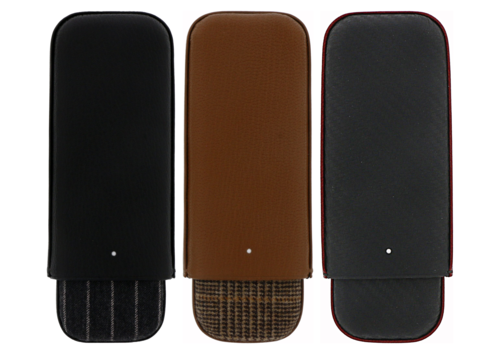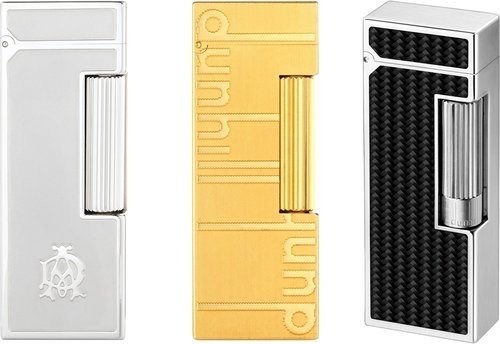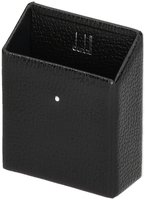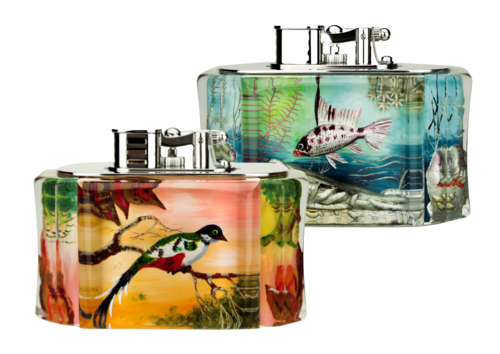Dunhill: Bestseller
Dunhill: All items
Dunhill Cigar Accessories: The Legend
For cigar smokers, the name Dunhill has an almost magical resonance. For decades, the brand has set standards—not only in terms of style but also in sales and distribution. As early as the beginning of the 20th century, Dunhill established strong ties with Cuba and imported famous Habanos such as Montecristo and Romeo y Julieta. After the socialist revolution, this bond strengthened further, with Dunhill acquiring exclusive rights for several brands as a partner of the Cuban state-owned company Cubatabaco. In Europe, the British company became synonymous with Cuban cigars.
Dunhill also distributed its own branded cigars, hand-rolled in Cuba. The company quickly realized the importance of marketing. Dunhill introduced Europe’s first walk-in humidor, a climate-controlled cedarwood cabinet—an innovation that tobacconists around the world sought to emulate.
Moving Away From Tobacco
Dunhill's exit from the tobacco industry began in the 1980s. The Cuban government took control of its own cigar marketing, and today, Dunhill has completely distanced itself from tobacco. However, fans of Dunhill's legendary tobacco blends are not left empty-handed—the rights were sold, and the original blends are now available under the Peterson brand.

The Richemont Group, Dunhill’s parent company, is behind this strategic shift. The focus is now solely on accessories. This division, formally known as "smoking accessories," has become Dunhill’s core business—alongside the iconic Dunhill The White Spot pipes.
To sum it up: Dunhill makes the hardware, while the software is found elsewhere.
Dunhill in London – Under German Management
Even after more than 100 years, Dunhill has lost none of its drive for perfection. On the contrary, the British brand continues to set standards. Many of its high-quality products, such as premium leather goods, are still made in North London, in the same workshop where Dunhill pipes are crafted. Here, highly skilled artisans produce these small treasures with the utmost attention to detail and a high degree of handcraftsmanship.
The workshop is headed by Kalmon Hener, a German from Munich, who is responsible for Dunhill’s exclusive production. And of course, he ensures that employees don’t miss their teatime—after all, England is the land of tradition, and at Dunhill, tradition is paramount.
The Complete Range: Dunhill Cigar Accessories
The Dunhill name is synonymous with top-tier lighters, cases, cutters, punches, and humidors. While these premium items may come with a higher price tag, they offer timeless elegance that defies fleeting trends, along with durability that makes them a lifetime investment.
Dunhill Lighter and Cigar Cases
Dunhill offers cigar cases for every occasion. Smokers can enjoy perfectly crafted, high-quality materials such as genuine cowhide leather. These cases provide excellent protection for your cigars without compromising on aesthetics. The dark brown Sidecar Cigar Cases look particularly elegant in sunlight.
If you're looking for protection for your Rollagas, the lighter cases from Dunhill are worth a closer look. While these cases may not be inexpensive, they promise top-notch protection in Dunhill's iconic design.
Dunhill Flint Stones
For all lighters with a flint wheel, Dunhill offers the appropriate flint stones. The red flints are suitable for the Dunhill Rollagas and Dunhill Mini Rollagas, while the Dunhill Unique and all other Dunhill lighters require blue flints. These flints are manufactured in Austria and guarantee the highest quality.
Dunhill Lighters: Rollagas and Unique
The Dunhill Unique was introduced in 1924 and features a side-mounted flint wheel with an open flame, making it particularly suitable for cigars. The Rollagas, launched in 1956, uses butane gas for a smooth, adjustable flame. Both are among the most well-known Dunhill lighters and are appreciated by smokers worldwide.
Dunhill Rollagas
Rollagas lighters from Dunhill have been the brand's flagship product since their launch in the 1950s and are a true symbol of luxury. Their sleek, slim design and unique rolling ignition mechanism, which produces a reliable flame by simply turning a side lever, set them apart from other lighters.

Rollagas lighters are not only practical tools but also sought-after collector’s items, known for their durability and longevity. Limited special editions are often adorned with precious metals or gemstones.
Dunhill Unique
Alfred Dunhill was already renowned in the 1920s for his innovations in luxury accessories for automobiles and smokers. The Dunhill Unique, the brand’s first lighter, set new standards in design and functionality and remains relevant to this day.
One of its most remarkable features is its one-handed operation, complemented by a robust flip mechanism. This mechanism and its compact design make the Unique lighter quick and easy to use, offering a significant advantage over traditional table lighters, which require two hands to operate.
The Dunhill Unique Turbo models have been optimized with jet flames for lighting cigars. For those seeking something truly special, the luxurious table lighters in the Dunhill Limited Edition Aquarium series are the perfect choice. Each features a removable Unique Turbo lighter inside.































